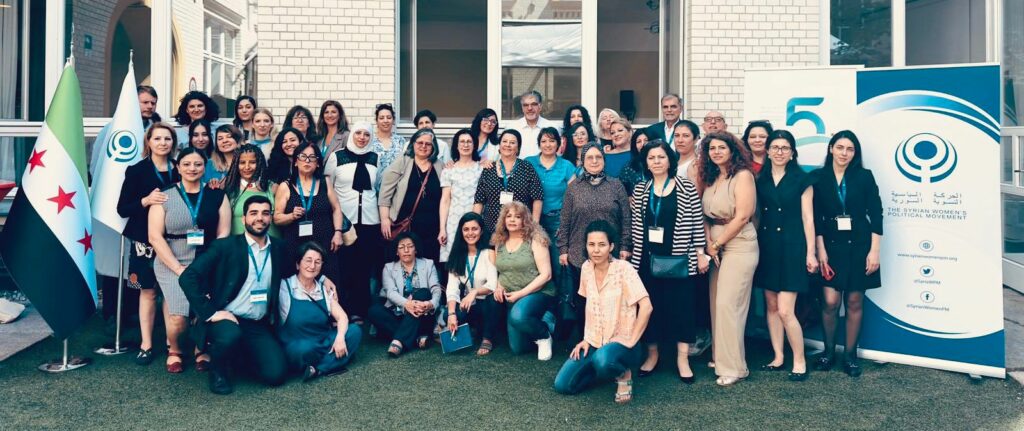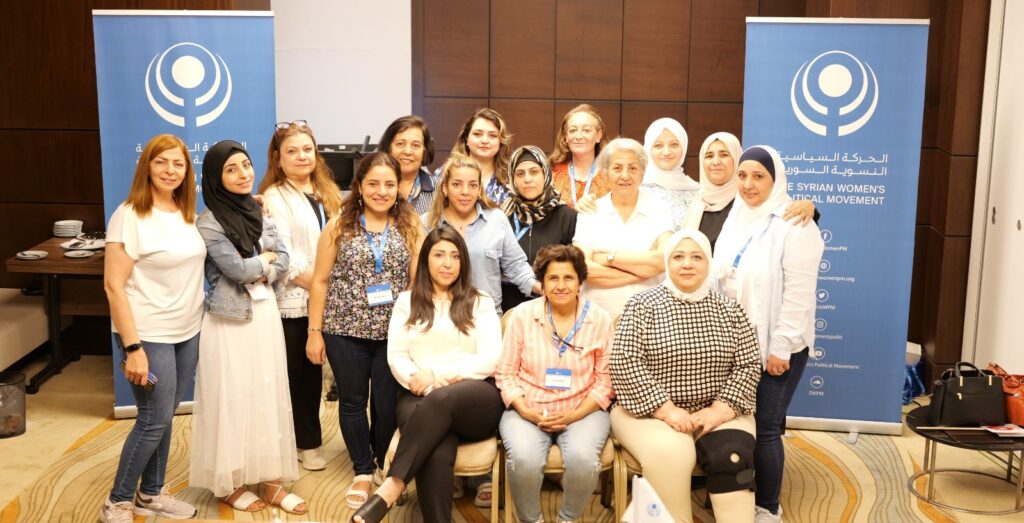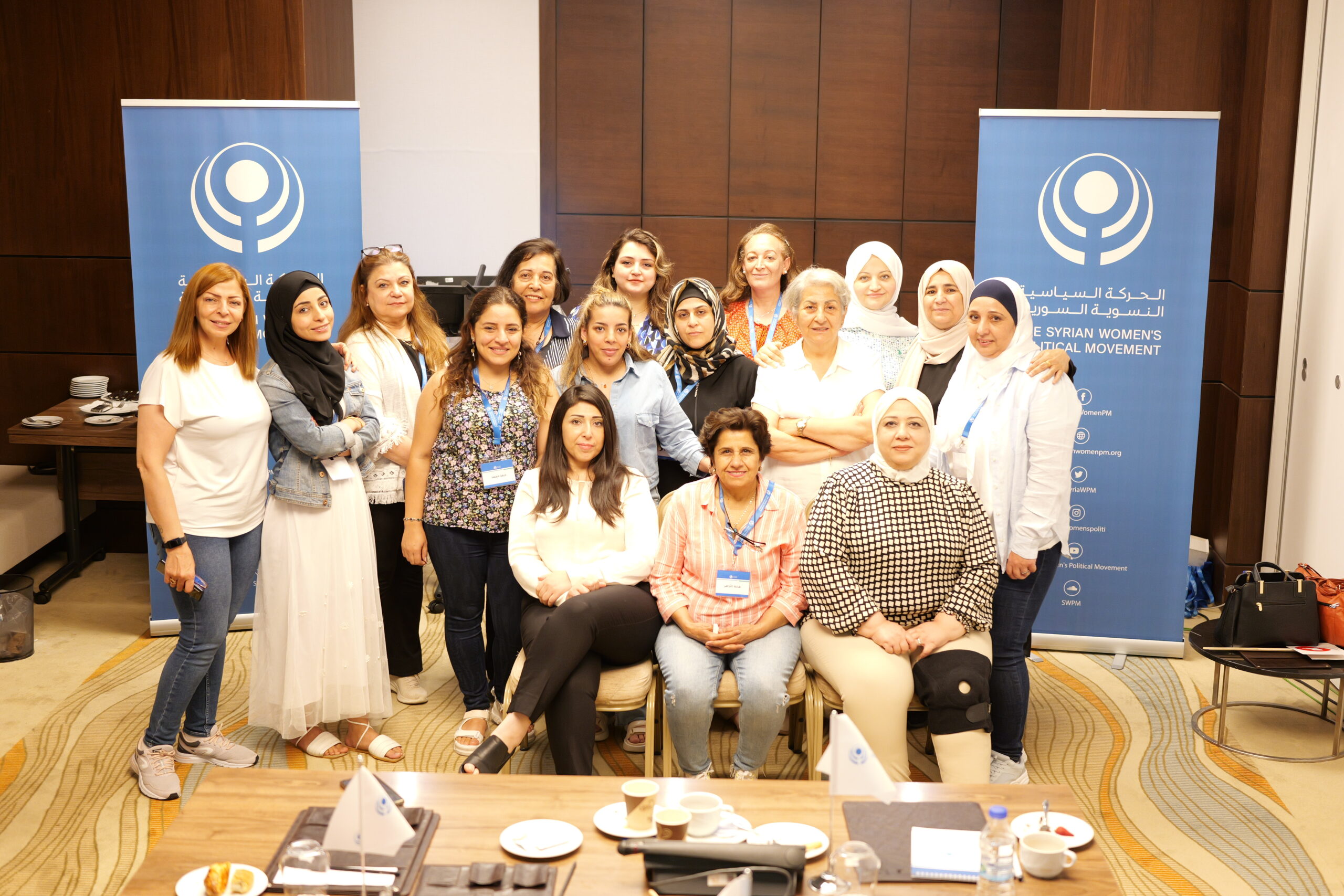The Final Communique of the Fifth General Assembly Conference of the Syrian Women’s Political Movement -24 to 26 June 2023
- updated: June 27, 2023
- |


Under the slogan ” we uprise together, we build together” the Syrian Women’s Political Movement convened its fifth general conference physically in Berlin and Istanbul, with virtual participation from members in various regions inside and outside Syria. The total number of attendees reached 76 members.
The conference commenced with a moment of silence to honor the victims of the recent earthquake and pay tribute to two late members, Basma Kodmani and Sahar Hawija. Following this, the members of the General Assembly delivered opening speeches from the three locations.
During both the physical and virtual sessions, the General Assembly deliberated on the reports presented by the organizational, administrative, financial, and oversight committees. Through a secret ballot, a new general secretariat and oversight committee were elected. Furthermore, the Assembly dedicated an entire day to discuss the political report, which provided an analysis of the Syrian political situation and its regional and international implications. The Assembly also reviewed and voted on position papers addressing the movement’s vision regarding decentralization in Syria, the electoral system that best ensures women’s representation, as well as the intersection of sanctions and feminism. These papers were approved, and the General Assembly arrived at the following conclusions:
1- The issue of detainees and missing persons is a humanitarian matter that should not be subject to political negotiations. Pressure must be exerted on the Syrian regime and all parties involved to find a solution. The Syrian Women’s Political Movement emphasizes the need to hold accountable the perpetrators of these violations, regardless of their affiliation.
2- The Syrian Women’s Political Movement believes that the existing de facto authorities do not represent the interests of Syrian women and men, nor do they form a foundation upon which to build the future of Syria. The solution lies in a political resolution that fully implements Security Council Resolution 2254, ensuring the restoration of national unity and the establishment of equal citizenship for all.
3- Addressing the dire economic crisis, which disproportionately affects vulnerable groups, particularly women, necessitates dismantling the war economy and holding those responsible accountable during the transitional period. It is essential to establish a developmental economy and address all factors contributing to economic weakness, including constitutional and legal frameworks that ensure equality and justice across social and economic domains.
4- The Syrian Women’s Political Movement rejects the politicization of humanitarian aid and calls for its distribution under the supervision of the UN and international bodies, ensuring fair allocation to affected areas and deserving recipients. The movement affirms that the corrupt Syrian regime is incapable of delivering aid to those in need, especially in areas outside its control. Therefore, the Security Council resolution on cross-border aid should be extended beyond the expiration of Resolution 2672.
5- Any engagement with the regime cannot be accepted unless a political solution is achieved under the United Nations’ auspices, including the pursuit of justice and holding all responsible for war crimes accountable.
6- The situation of refugee and displaced women requires comprehensive humanitarian treatment that respects human rights and adheres to international standards. The principle of non-refoulement must be upheld for both male and female refugees, ensuring their safe, voluntary, and dignified return. The movement rejects any plans for forced demographic changes that pose a threat to Syria as a whole.
7- A minimum quota of 30% should be implemented to achieve gender parity in any opposition body, committee, or delegation involved in the political process and transitional stage. If these positions are not filled by women, they should remain vacant.
8- The Syrian Women’s Political Movement considers decentralization in all its dimensions to be a complex process requiring careful planning and implementation. It believes that successful decentralization relies on building a strong central government alongside efficient and empowered local governance. This necessitates appropriate constitutional, legal, and regulatory frameworks, institutional structures, and financial mechanisms.
9- The electoral system should ensure fair representation of women in the People’s Assembly, provincial councils, cities, villages, and all decision-making bodies requiring elections. Establishing a fair and transparent democratic electoral system is crucial for achieving equality, justice, and democratic values in society.
10- Intersectional feminism plays a crucial role in driving the necessary social and political change toward achieving social justice. It is a feminist methodology that acknowledges and examines the complex and intersecting forms of discrimination faced by women in all societies. In the Syrian context, Syrian women face discrimination and persecution based on gender, intersecting with various other forms of discrimination, such as political persecution, social class, religious discrimination, and social factors, along with discrimination related to asylum, displacement, and the intersection of gender and sexuality.
11- Sanctions imposed on Syria should be more targeted to prioritize the welfare of civilians and minimize negative consequences for them. Existing sanctions programs should be reviewed and dismantled. Collaborative efforts with Syrian experts should be undertaken from economic, political, and legal perspectives to assess which sanctions have more negative than positive effects. Specifically, sanctions targeting sectors that hinder improvements in the living conditions of the general population should be reevaluated, considering the limited benefit the regime would derive from their removal.
